Breakout Sessions
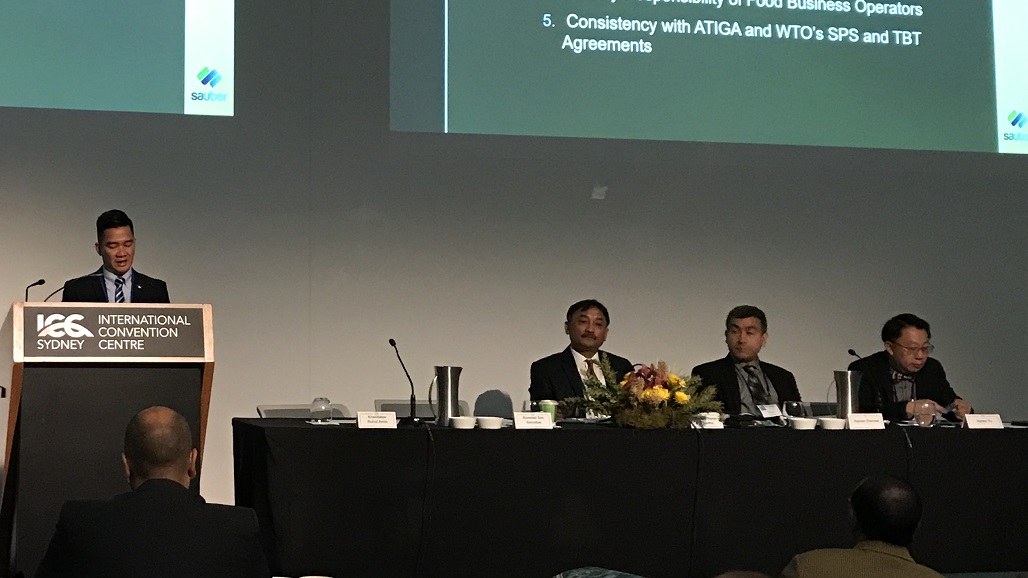
Chaired by Mr. Pradeep Kumar Shrestha, Vice President of CACCI and Former President of Federation of Nepalese Chambers of Commerce and Industry (FNCCI), the Roundtable Discussion of the Asian Council on Food and Agriculture featured the following three speakers: (1) Mr. Rommel Sim Gerodias, President and CEO of Sauber Professionals from Philippines; (2) Mr. Pejman Chehrazi, Senior Expert of Iran Chamber of Commerce, Industries, Mines and Agriculture from Iran; and (3) Mr. Homer Yu, Secretary of Business Affairs Dept. of Kowloon Chamber of Commerce from Hong Kong.
Mr. Shrestha opened the Discussion by welcoming delegates from different countries and shared his views on the latest trends of the food and agriculture sector in the region. In countries such as Nepal, Mr. Shrestha emphasized the importance of agriculture for economic development and stability, and indicated the need to keep a balance between growth of the country’s economy and agricultural development.
Mr. Rommel Sim Gerodias focused his presentation on the food security in the ASEAN region. In his report, Mr. Gerodias introduced to the audience the 10 principles of ASEAN Food Security Policy, namely: (1) Integrated “Food Chain” Approach; (2) Systematic Risk Analysis Framework; (3) Science-based, Independent Risk Assessment Process; (4) Primary Responsibility of Food Business Operators; (5) Consistency with ATIGA and WTO’s SPS and TBT Agreements; (6) Equivalence and Mutual Recognition; (7) Harmonisation with International Standards; (8) Reliable Traceability System; (9) Strengthening and Harmonisation of Regionaland National Food Control Systems; and (10) Transparency. In addition, he also talked about the disruptions on food safety beyond ASEAN – the Industrial Internet of Things (IIoT).
From the perspective of Iran, Mr. Pejman Chehrazi shared the country’s current state and forecast for the agricultural sector. First of all, Mr. Chehrazi reported on the country profile of Iran as well as its food and agriculture governance structure. Due to the diverse climates and geographical regions, Iran has become a center of diversity of many major crops of global importance.
Furthermore, Iran also promotes organic products to address environmental problems. On the other hand, Iran’s agriculture sector faces several challenges, such as increased demand for food, self-sufficiency issue, growing need for investments, modernization of the agricultural sector, among others. To cope with these challenges, Mr. Chehrazi proposed to adopt some strategies, like promoting conservation agriculture.
Mr. Homer Yu elaborated his idea on the Halal international ecosystem. In recent years, with the rise of the Muslim tourism market, more and more countries have increased their concern for Muslims, including the catering industry, cosmetics Industry, hotel industry, clothing and footwear manufacturing.
Even for logistics, Halal process is involved in the managing the procurement, movement, storage and supply chain in compliance with the general principles of Shariah Law. In this connection, Mr. Yu introduced the “The Belt and Road Initiative—HALAL” which is carried out by the Eurasian Center with related services.Chaired by Mr. Pradeep Kumar Shrestha, Vice President of CACCI and Former President of Federation of Nepalese Chambers of Commerce and Industry (FNCCI), the Roundtable Discussion of the Asian Council on Food and Agriculture featured the following three speakers: (1) Mr. Rommel Sim Gerodias, President and CEO of Sauber Professionals from Philippines; (2) Mr. Pejman Chehrazi, Senior Expert of Iran Chamber of Commerce, Industries, Mines and Agriculture from Iran; and (3) Mr. Homer Yu, Secretary of Business Affairs Dept. of Kowloon Chamber of Commerce from Hong Kong.
Mr. Shrestha opened the Discussion by welcoming delegates from different countries and shared his views on the latest trends of the food and agriculture sector in the region. In countries such as Nepal, Mr. Shrestha emphasized the importance of agriculture for economic development and stability, and indicated the need to keep a balance between growth of the country’s economy and agricultural development.
Mr. Rommel Sim Gerodias focused his presentation on the food security in the ASEAN region. In his report, Mr. Gerodias introduced to the audience the 10 principles of ASEAN Food Security Policy, namely: (1) Integrated “Food Chain” Approach; (2) Systematic Risk Analysis Framework; (3) Science-based, Independent Risk Assessment Process; (4) Primary Responsibility of Food Business Operators; (5) Consistency with ATIGA and WTO’s SPS and TBT Agreements; (6) Equivalence and Mutual Recognition; (7) Harmonisation with International Standards; (8) Reliable Traceability System; (9) Strengthening and Harmonisation of Regionaland National Food Control Systems; and (10) Transparency. In addition, he also talked about the disruptions on food safety beyond ASEAN – the Industrial Internet of Things (IIoT).
From the perspective of Iran, Mr. Pejman Chehrazi shared the country’s current state and forecast for the agricultural sector. First of all, Mr. Chehrazi reported on the country profile of Iran as well as its food and agriculture governance structure. Due to the diverse climates and geographical regions, Iran has become a center of diversity of many major crops of global importance.
Furthermore, Iran also promotes organic products to address environmental problems. On the other hand, Iran’s agriculture sector faces several challenges, such as increased demand for food, self-sufficiency issue, growing need for investments, modernization of the agricultural sector, among others. To cope with these challenges, Mr. Chehrazi proposed to adopt some strategies, like promoting conservation agriculture.
Mr. Homer Yu elaborated his idea on the Halal international ecosystem. In recent years, with the rise of the Muslim tourism market, more and more countries have increased their concern for Muslims, including the catering industry, cosmetics Industry, hotel industry, clothing and footwear manufacturing.
Even for logistics, Halal process is involved in the managing the procurement, movement, storage and supply chain in compliance with the general principles of Shariah Law. In this connection, Mr. Yu introduced the “The Belt and Road Initiative—HALAL” which is carried out by the Eurasian Center with related services.
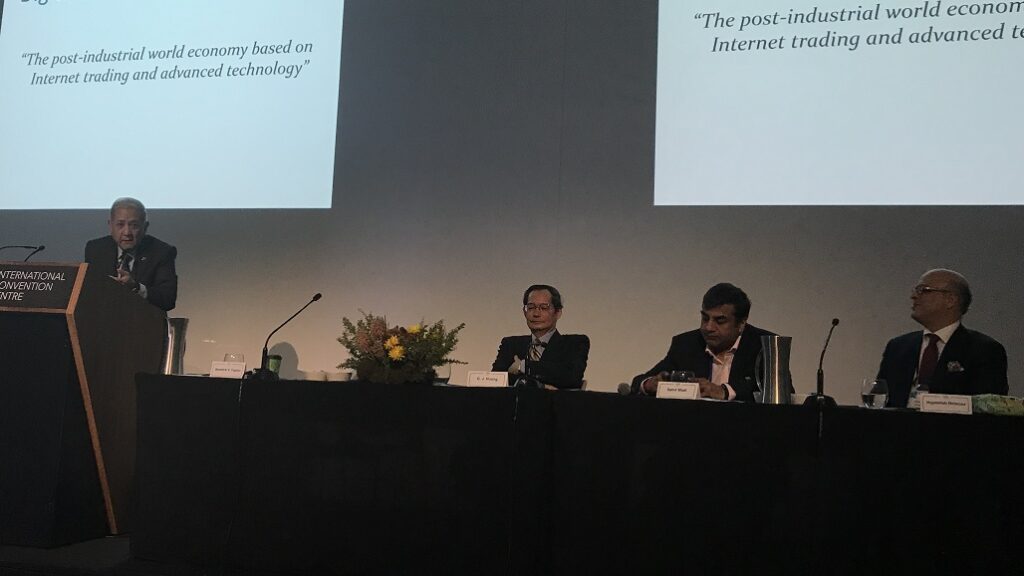
Asian ICT Council Chairman Dr. G. J. Huang, Fellow of Information Industry Institute from Taiwan made a presentation on “Recent Trends and Developments in the ICT Sector.” According to Dr. Huang, the application of ICT would push for a smart life for human beings, including smart manufacturing, smart health and smart environment, among others.
He also elaborated on the recent trends on the ICT industry, such as the Internet of Things (IoT), cloud computing and big data, which all bring great differences to the world. In particular, Dr. Huang mentioned the AI technology, superb computing power, cognizant computing, computing of emotions, incremental vs. disruptive innovation and share economy, and analyzed that all of these are going to be the focus of the future development of the ICT industry.
Amb. Benedicto V. Yujuico, Immediate Past President of CACCI and Chairman of Philippine CCI, shared with the audience his observations on “Digital Economy.” Amb. Yujuico pointed out that there are four key digital trends, namely: AI (Artificial Intelligence) and Robotics, 3D- and 4D-printing, Blockchain technology and Sharing economy. He furthermore cited his own life experiences as example to explain how these new developments have changed people’s lifestyles. Amb. Yujuico also discussed the case of ASEAN, examining the roadblocks, solutions and future of the region in the area of ICT development.
Mr. Hojatollah Behrooz, Strategic Advisor of Tehran Chamber of Commerce, Industries, and Mines, made a presentation on “e-certificate of origin.” Mr. Behrooz introduced the current status of e-certificate of origin system and analyzed its disadvantages. In this connection, he advocated a new mechanism that could be easily accessed and could provide sufficient information. He emphasized that the new mechanism would also help better communication between companies and chambers.
From the perspective of India, Mr. Samir Modi, Senior Vice President of CACCI and Executive Director of K. K. Modi Group, spoke of the application of big data and the ICT development. Mr. Modi also stressed that the penetration of cell phones in Indian people’s daily life has enabled them to do a lot of things without personal presence, such as mobile banking and remote communications. In light of this, India is expected to adopt more ICT applications in the future.
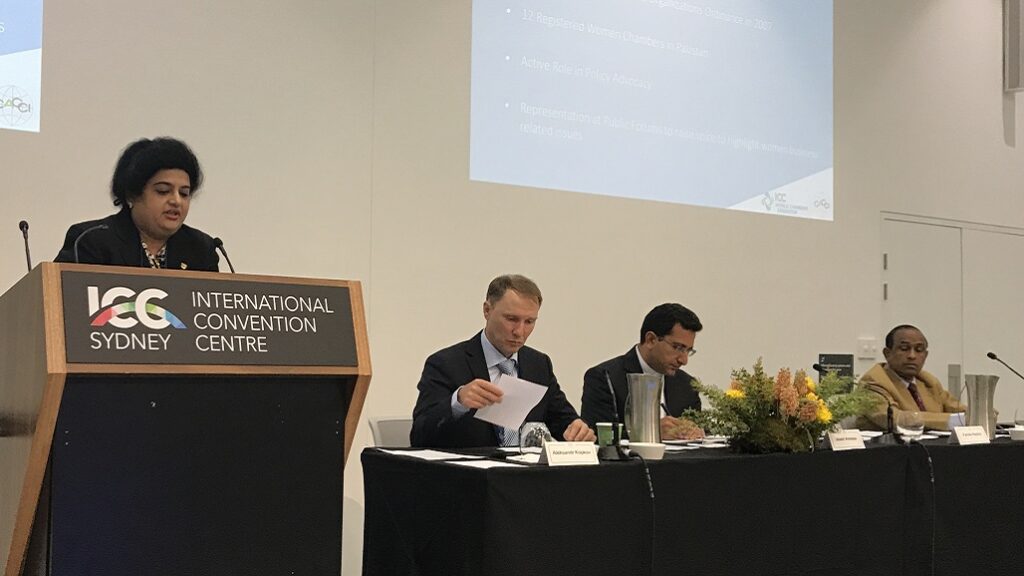
Dr. Arash Anissian, MD MPH, Deputy of Education Affairs of Iranian International Health Tourism Association focused his presentation on “Recent Trends and Developments in Asia and Pacific Region.” Dr. Anissian talked about new demands changes in research and developments in healthcare services, pharmaceutical, healthcare providers and new start up emerging during last few years.
He also spoke of the role of education in sustainable development and educational challenges in the Asia Pacific region amid the fast changing world.
Dr. Aleksandr Kopkov, Director, International Cooperation Department, Chamber of Commerce & Industry of the Russian Federation (CCIRF) talked about CCIRF’s best practice experience in Education. He explained how they perform need assessment process for Russian businessmen, how they develop curriculum, and how to develop the educational program.
Ms. Farida Rashid, Chairperson of Islamabad Women CCI, presented the activities and plans of Pakistan Women CCI in the country’s health and education sector Ms. Rashid described what they did in Pakistan’s national health system development and educational programs. She also talked about complications and limitations they faced at the Islamabad Women CCI.
Mr. Mirza A. Syead, Managing Director, Parents Ind. Ltd. from Bangladesh reported on the state of health and education in Bangladesh and the opportunities for business and investment in the country. In addition, he indicated the shortage in primary, secondary schools, educational centers and medical doctors in Bangladesh and the opportunities for further development.
As Chairman of Asian Council on Health and Education, Dr. Anissian suggested to the CACCI Council the following:
- Establishment of a core group in the Asian Council on Health and Education (ACHE) to exchange of information on and discuss business challenges and opportunities among member countries will help to develop Asia and Pacific regional business.
- Preparation by the core group of a strategic plan to achieve CACCI’s goals in health and education sector.
- Creation of an ACHE portal through which ACHE and CACCI members can share the information and business opportunities among member countries.
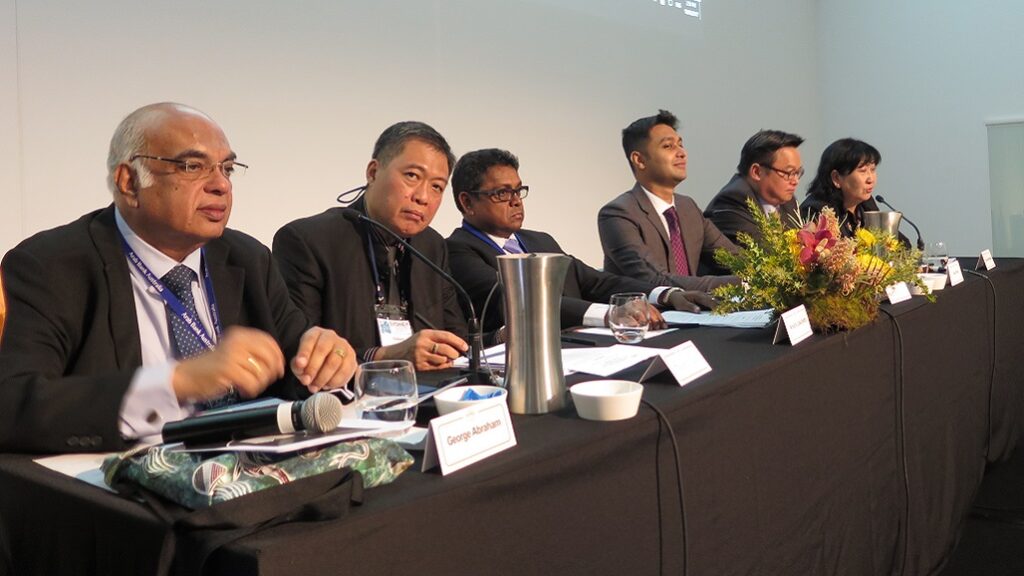
Mr. George Abraham, Chairman of the SME Development Council (SMEDC) from Singapore, presided over the roundtable discussion on SME development.
Mr. Anura Lokuhetty, Chairman of the Asian Council on Tourism from Sri Lanka, reported on the contribution of the SME sector to the economy of Sri Lanka, citing its share in the country’s employment, gross domestic product, and number of certificates of origin issued to exports to EU countries, among others.
He also outlined some of the government policies aimed at promoting the growth of the country’s SME sector, including productivity improvement program, skills development training program, apparel-based cottage industry program, establishment of an Incubator and Technology Transfer Center, development of banana fibre based cottage industry, traditional production village programme, development of enterprise village an women entrepreneurship programme, and economic empowerment of women through establishment of 150 mini apparel factories project.
Mr. Lokuhetty also identified possible areas of cooperation among Asian countries to promote SMEs, including access to new overs markets, knowledge transfer, adopting high technology, fund transfer, access to business support services, obtaining global recognition, exchange of resources, integration with global value chains and adoption of industrial best practices.
Mr. Alex Chen, Chairman of Roo Hsing Co. Ltd. from Taiwan, talked about the his company – its history, how it achieved growth to become the world’s largest manufacturing group of jeans, what it did to enhance production efficiency and adjustment (through the application of automation in the factory and the centralization of logistics operation); its facilities around the world; and the global market for clothing and for denim jeans.
Mrs. Magvan Oyunchimeg, CEO of the Mongolian National Chamber of Commerce and Industry (MNCCI), made a presentation on the contribution of SMEs to Mongolia’s economy, the challenges and opportunities in the SME sector, and the activities of MNCCI to promote the growth and development of SMEs in the country. She also enumerated areas wherein countries in the region can cooperate to promote SME development.
These include: exchanging information on and benchmarking SME promotion policies of countries in the region, providing business connections to SMEs among countries in the region, and working together to integrate SMEs in the region to the global value chain.
Mr. Muhammed Amzad Hussain, Director at the Federation of Bangladesh Chambers of Commerce and Industry (FBCCI), talked about the contribution of small and medium enterprises to the economic growth and development of Bangladesh. He identified some of the important emerging SME sub-sectors in the country such as ceramics, leather and leather goods, pharmaceuticals, jute goods, and textiles. He also made some recommendations on how to further promote the growth and development of SMEs in the country, including the improvement of the legal framework governing the SME sector.
Mr. Edward Du, President of Negros Oriental Chamber of Commerce and Indust6ry (NOCCI), made a presentation on the activities and programs of NOCCI to help promote – through cooperation with the Department of Trade and Industry – the growth and development of micro, small and medium enterprises (MSMEs) in the province of Negros Oriental and their neighboring provinces. These include, among others, the following: (a) Creation of the Provincial MSME Development Council; (b) Launching of the KAPATID MENTOR ME (KMME) Project; (c) Establishment of 10 NEGOSYO Centers or One Stop Shop Business Centers; and (d) Launching of the Shared Service Facility (SSF) Program.
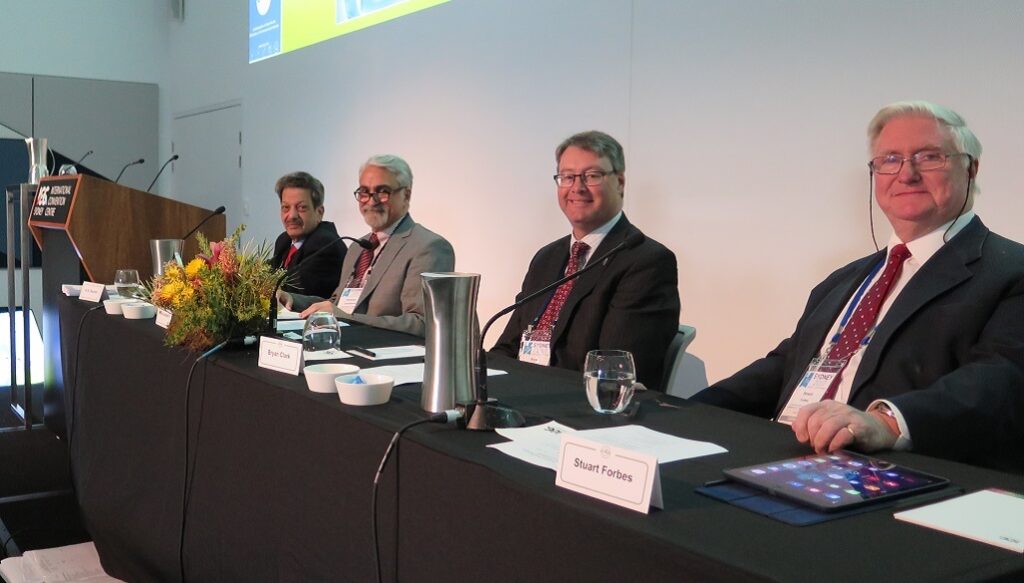
Dr. Esfandiar Omidbakhsh, Director-General of International and Regional Organization at the Iran Chamber of Commerce, Industries, Mines and Agriculture, said that in a world increasingly characterized by globalized manufacturing, on-time production, and integrated supply chain, there has been a growing recognition of the need for global rules to facilitate trade.
He said that simplification, modernization and harmonization of export and import processes have emerged as key issues for world trading system. In this regard, he cited some of the major policy reforms undertaken by the Iranian government to address these issues in order to promote Iranian trade in the global market.
Mr. Bryan Clark, Director, Trade and international Affairs at the Australian Chamber of Commerce and Industry, made a presentation on the ongoing public-private dialogue among APEC member countries on Rules of Origin.
He cited the major reasons why Rules of Origin are important for both governments and businesses. He also mentioned some of the existing non-tariff barriers (such as Preferential Trade Agreements) and what can governments and businesses do to overcome these barriers, stressing that the first step is the need to access trade agreement texts.
Mr. Stewart Forbes, Director at Asian Business Network, made a presentation on the policies of Malaysia to help promote trade with other countries. He said that Malaysia has a population approaching 35 million and a modest labour force in the order of 14 million
Thus supporting a growing economy demands that Malaysia maintains an active trading environment and rejects protectionist policies in favour of an free market model. Trade facilitation and engagement through participation in regional and global trade agreements is essential for Malaysia to achieve its developmental goals by 2020.
Mr. Forbes noted that despite elements of protectionism appearing in major economies and continued limited progress delivered by multilateral agreements, it is suggested that continued efforts to use bi-lateral and regional agreements offers the most effective pathway to facilitate trade and contribute to the growth of LDC and developing nations.
In the absence of clear leadership, inconsistent global economic progress and negative geopolitical activities, it is incumbent that trade associations and CCIs to develop a more coordinated and positive voice in favour of trade under a consistent rules based regime. Entities such as CACCI, ICC, WCF require to develop coordinated policies on trade generation, cross border facilitation and commonality of rules so as to enhance their domestic economies and deliver both economic an social benefits to their populations.
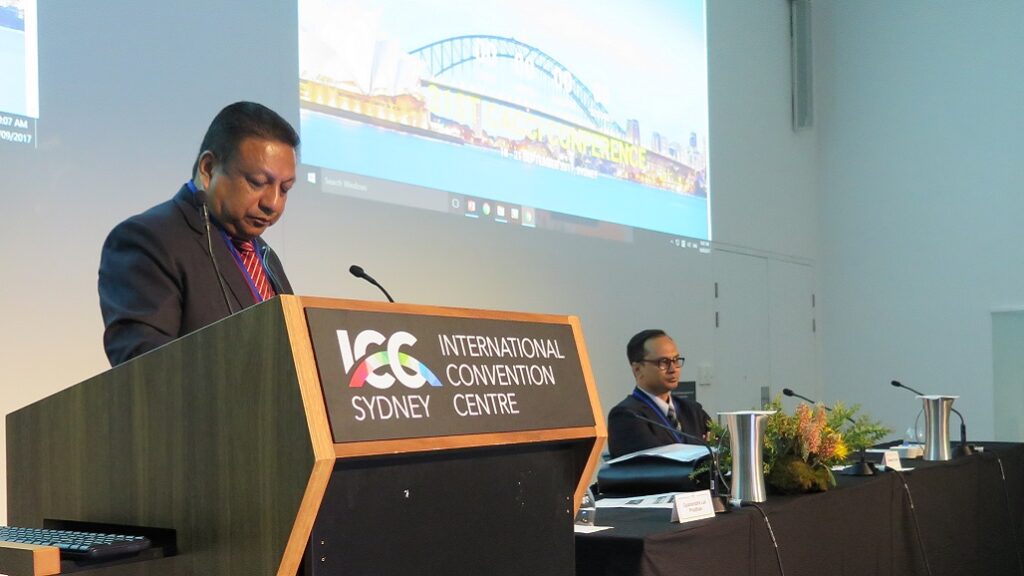
Mr. Gyanendra Lal Pradhan, Chairman of the Asian Council on Water, Energy and Environment and Executive Chairman of Hydro Solutions Pvt Ltd. from Nepal on the current situation in the water, energy and environment sectors in South Asian countries, citing their contribution in accelerating economic growth in the region. He stressed that hydropower makes the usage of water cheaper and efficient, thereby making a positive impact on water, energy and food production.
However, he also pointed out some changes in the climate scenario in the region, such as rising temperatures, rising sea levels, melting of the Himalayan glaciers, and increasing intensity of rainfalls. He also presented some of the ongoing and planned hydropower projects being undertaken or to be implemented jointly by countries in the region.
Mr. Salauddin Yousuf, Director of Lub-rref from Bangladesh, made a presentation on his company, its objectives and its activities. He noted that his company’s vision is to be forerunner in creating a global standard ‘green’ organization in Bangladesh, and that it’s mission is to provide innovative high performing products and service solutions by adopting modern green technologies for business growth and sustainability and stakeholders’ satisfaction.
Mr. Yousuf said that in context of the economy and the environment of Bangladesh, it is very clear to his company that setting up of a re-refinery is necessary. However, he pointed that despite the fact that re-refining industries are considered essential to the economy and environment they are still not considered a priority sector. As a result this sector is facing immense hurdles in his country. His company is doing its part to overcome these hurdles.







